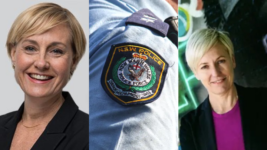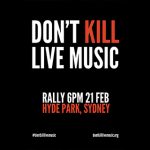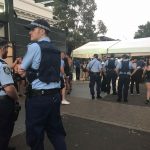The Slow Drip Death of the NSW Festival Industry: A Targeted State Approach

The Australian festival industry is still struggling post-pandemic shutdown. Main stayer Groovin the Moo had to cancel its annual regional tour last February, while Victoria’s three-decade-old Falls Festival had to cancel its last New Year’s Eve event, with dozens more music festivals also affected.
But with another NSW festival, Return to Rio, announcing this month that it won’t be running in 2024, those in the local industry are decrying that events are fast becoming financially unviable, and in this state, organisers are too grappling with an attack that began long before the onset of COVID.
New South Wales accounts for around 25 percent of this nation’s industry. And the main issue that organisers, politicians and lawyers are highlighting at present, is that the imposition of the NSW Police Force User Pays System, as required under the Music Festivals Act 2019 (NSW) (the Act), is killing events.
And while the Berejiklian government-enacted laws, coupled with the COVID shutdown and extreme weathers events, all having left this state’s industry ailing, the truth is, NSW police launched its user pays system in 2018, as a concerted approach to shut down events it was targeting.
And this strategy was subsequently enacted into law at a time when there had been a spate of drug-related deaths at NSW festivals, and rather than consider drug harm reduction measures, the state moved to cripple the industry, and the results of this are continuing to play out today.
The birth of user pays policing
NSW police announced it would attempt to shut down the next Dragon Dreaming festival in 2015. And organisers from the Psyfari event contacted SCL in August 2016, advising that their event was too being targeted. And the reason presented by police was safety, especially that related to drugs.
Yet, this drastic approach to illicit drug possession and use at events is not that taken in other jurisdictions, because it doesn’t work. And rather pill testing, which scientifically checks drugs and warns users of any potential harms, has been officially operating in certain European nations since the 1990s.
Pill testing, or drug checking, as it’s known in Europe, is now further operating across the entire country of New Zealand, in the Australian Capital Territory, along with its more recent roll out in Queensland, where it was launched at the Rabbit Eats Lettuce festival this year.
The pattern that developed late last decade in this state, however, saw police ordering organisers to cancel events, and if refused, calling on council to do so. But organisers were then taking this to court, and, as with the case of a 2018 Rabbits Eat Lettuce event, it was ruled they could continue.
Yet, even with court sanction, the 2018 event, Bohemian Beatfreaks, was still forced to move across the border into Queensland, as, after organisers lodged their challenge, the NSWPF issued a $200,000 quote for its services, despite its earlier quote for the exact same event being $16,000.
And this increased financial burden was to cover the cost of a newly required 57 officers at the event of 3,000 punters, which was slightly up on the four NSW police officers sent out to supervise the festival the year prior.
This marked the birth of the NSW Police Force User Pays system and saturation policing at NSW music festivals, which are both regular aspects to these events that serve to debilitate the viability of their continuing into the future.
A targeted decline
As to the suggestion that NSW police implemented the user pays system half a decade ago, as a means to kill off music festivals, NSW Greens music and night-time economy spokesperson Cate Faehrmann told Sydney Criminal Lawyers, that the “sentiment still rings true today.”
“There is no justification for the exorbitant fees and regulatory burden the government continues to put on festival organisers,” she added.
“On 5 March, music and night-time economy minister John Graham said he would release the findings of the review of the Music Festivals Act 2019 ‘shortly’.”
These exorbitant fees that Faehrmann refers to saw Return to Rio complaining of a 529 percent increase on 2019 policing and medical expenses, which, if not cancelled, would have related to organisers paying $110,000 in policing fees, which is now simply presented as a normal expense.
NSW Labor last year announced a review of the Act, which passed in late 2019, after the previous summer saw then premier Gladys Berejiklian implement an initial festival licensing regime, whilst refusing to consider pill testing, after five young people died in drug-related circumstances at events.
The regime established under the Act serves to identify high risk or “subject” events, via the Independent Liquor and Gaming Authority requiring certain festivals to submit a safety plan, then scrutinised by NSWPF and NSW Health, and if not approved, it is then deemed a subject event.
Indeed, as Australian Festival Association managing director Mitch Wilson told The Guardian last November, once a festival has been labelled a subject event, the NSW Police Force then dictates how many police officers are required. And the cost of each officer is $144 an hour, including GST.
As the festival cancellations continue, and the Minns government simply holds back on releasing its findings on how to set the industry on a path to recovery, is led to has led Faehrmann to ask, “Does the government want to continue watching the decline of the music festival scene?”
And the Greens MLC then confirmed that the actions of NSW Labor “or lack thereof, say they do”.
Paying for punter harassment
In the wake of Return to Rio announcing its 2024 cancellation, the Redfern Legal Centre pointed out that not only is the NSW festival licensing regime requiring events to pay exorbitant prices for their own saturation policing, but the arrangement results paying for the harassment of patrons.
Walls of armed blue uniformed bodies accompanied by drug detection dogs have become a signature feature of the NSW festival scene over the last decade, with festivalgoers not only required to purchase tickets, but further to run the gauntlet of NSW police officers to gain access to an event.
The issues involved here are numerous, as a dog indication leads to a pat down search, which if nothing is turned up, can then be followed by a strip search, which often traumatises the subject. And this police presence is also known to lead to dangerous acts of drugtaking that can cause death.
“Over policing not only burdens festival organisers but also curtails the cultural and economic contributions of the industry and does not make festivals safer for attendees,” Redfern Legal Centre police accountability solicitor Samantha Lee told Sydney Criminal Lawyers.
“The imposition of the user pays system and excessive policing at music festivals has directly contributed to their cancellation,” she further underscored. “Young people should be able to enjoy live music without the fear of invasive and humiliating strip searches.”
State-sanctioned extortion
But state authorities appear to have convinced the NSW constituency that not only should music festivals be the site of saturation policing and often illegally applied strip searches, but festivals are these days paying extortionate rates for services run by a NSW taxpayer-funded agency.
“It really is beyond the pale that a government which says it supports the music and night-time scene in NSW, forces festivals to pay for law enforcement,” Faehrmann said. “No other state or territory places the same burden on festival organisers.”
And the NSW Greens MCL raised this matter with the minister at March budget estimates, pointing out that a 2023 NSW music festival with 35,000 attendees was charged $120,465 for policing fees, while its Victorian counterpart, with 40,000 punters, had to pay $9,519 for officers.
Minister Graham replied that he was unsure if it was “fair” for the NSW festival organisers to have to provide NSW police with $110,000 more than similar events south of the border pay their local law enforcement service, however he was able to admit that the situation is of “concern”.
But nothing has occurred since then. And meanwhile, as the NSW campaign to see pill testing services rolled out has picked up, especially with Queensland recently committing to a fixed site service just like that in the ACT, NSW premier Chris Minns has dug in his heels to oppose such calls.
“I urge the minister to step up and abolish user pays policing, allow pill testing at music festivals, and provide more financial support to Australian music festival organisers,” Faehrmann said in conclusion, “or else our vibrant music festival scene may never recover.”







